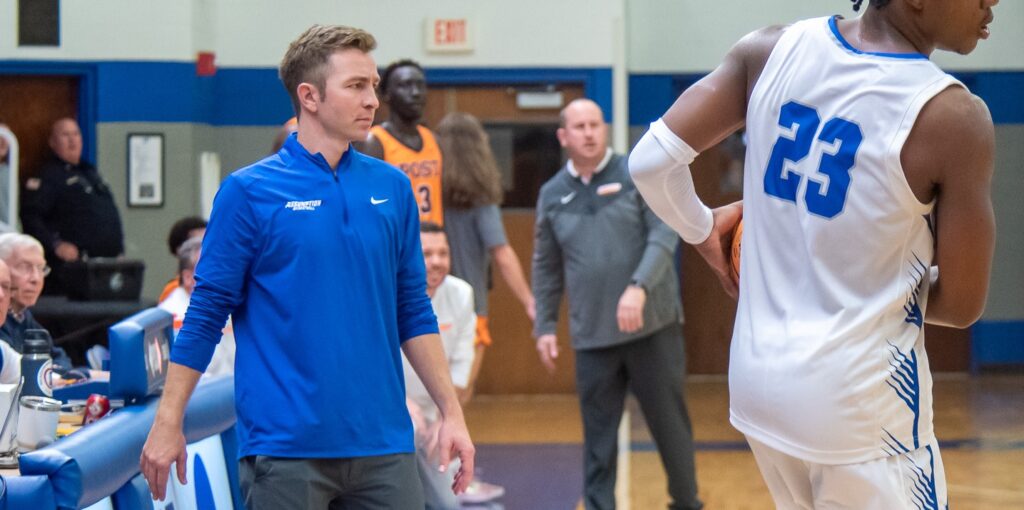By Mike Whaley
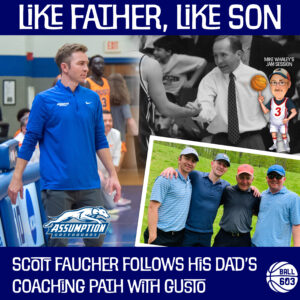 It’s been an exceptionally frantic winter for Scott Faucher, the head coach of the Assumption University men’s basketball team. As usual, he’s working his tush off pushing the Greyhounds to compete to the best of their ability in the always rigorous Northeast-10 Conference. As of Tuesday, they were 9-8 in the NE-10 (tied for sixth with Pace) and 13-10 overall.
It’s been an exceptionally frantic winter for Scott Faucher, the head coach of the Assumption University men’s basketball team. As usual, he’s working his tush off pushing the Greyhounds to compete to the best of their ability in the always rigorous Northeast-10 Conference. As of Tuesday, they were 9-8 in the NE-10 (tied for sixth with Pace) and 13-10 overall.
As if the winter wasn’t hectic enough, Scott’s wife Lindsay gave birth to twins (Luke and Jenny) as the season was getting ready to kick off two and a half months ago. “We couldn’t have timed it worse,” he laughed. “They were born right during the first tournament of the season.”
Faucher is in his 10th year overall as a second-generation college basketball coach. This is his fourth season as the head coach at Assumption with a stop before that at Nichols College as a head coach in 2018-19. He got his start as an assistant at St. Michael’s College in 2013-14 before moving on to Bowdoin College in Brunswick, Maine, for four years. A native of Lebanon and a former player at Wheaton College in Norton, Massachusetts, he is the youngest son of Dave Faucher, who coached the Dartmouth College men for 13 seasons.
Scott is 12 and 13 years younger than his two older brothers, Joey and Mike. “When I was growing up, obviously I spent a lot of time in the Lebanon High School gym watching my brothers play at Lebanon,” he said. “I had those guys as mentors basically. I watched their every move and fell in love with the game of basketball.”
“All those guys, my brothers and my dad, they kind of shaped my basketball journey. I had some strong influences in my life,” Scott said.
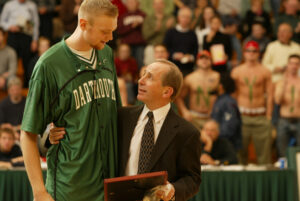
Dave recalls ever since Scott was born he went to his brothers’ games and also the Dartmouth games. “So when he was one year old, he probably went to more basketball games than any kid in America at that point,” Dave said with a chuckle. A native of Somersworth, Dave graduated from the University of New Hampshire in 1972 where he got his first basketball job as an assistant coach under the late Gerry Friel. He had several high school coaching stints (Newmarket, Sanborn) after two years at UNH before he made his way to the Upper Valley in the early 1980s. He joined the Dartmouth program under Paul Cormier in 1984, eventually becoming the head coach in 1991.
When Scott was four, five and then six years of age, it was every day in the gym. “There was no babysitter for me or anything like that,” he recalled. “I’d get out of school growing up and go right to the gym in Lebanon or go to Dartmouth.”
Dave said that when they were younger, his older boys were ball boys for Dartmouth, where he was the head coach from 1991 to 2004. “Then Scott became a ball boy,” he said. “He was the most serious ball boy I’ve ever seen. He used to be in charge of three other kids. They knew who had to get what water bottles and who would sweep the floor and who’d be down the other end and who would collect the basketballs. He took it so seriously.”
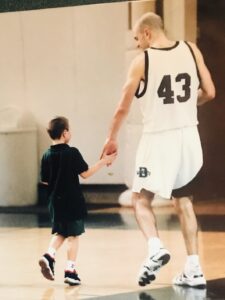
After Dartmouth games, Dave would shut the gym down, and let Scott and his little friends play basketball on the main court. “It was 2 v 2 or 3 v 3 and all that stuff, just playing around,” Dave remembered. “He was around the game his whole life.”
When his older brothers played basketball at Middlebury College in Vermont, Scott made the trip over with his parents to be a ball boy and spend a lot of time in the gym. It left an impression. “I just watched how those guys worked every day,” Scott said. “They obviously loved the game and had a passion for it that I was able to witness at a young age. Now that I’ve grown up, I still have it to this day.”
Scott also went to the Carter Community Building in Lebanon to watch local players and the effort they put in to improve their game. “I would just go and sit and watch those guys work,” he said.
Scott gives his dad a lot of credit with how he has evolved as a coach, and certainly being around the Dartmouth program played an influential role. “I was fortunate at a young age to be thrown into that type of college environment,” he said. “The way I looked at it growing up, I had my family, but I also had the Dartmouth basketball family. There were 15 players in the locker room to look up to as players for the Big Green.
“It was a similar mentality just enjoying being around the gym,” Scott said. “I would go in and rebound for all those college players. I enjoyed it beyond the basketball team environment, and enjoyed the team relationships that come through basketball. I think that’s why early on I wanted to become a college coach whenever my time was done playing basketball.”
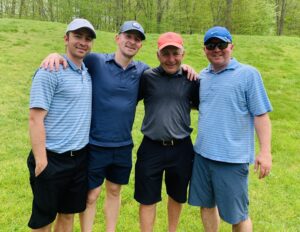
Scott agrees that his dad helped to shape his coaching career. “I really look up to him as a basketball coach,” he said. “He’s very smart, especially when it comes to Xs and Os. It goes back to a lot of late nights sitting around the dining room table and moving around salt and pepper shakers and doing Xs and Os. He would talk you through the game. Him and I still talk pretty much every day about things. It certainly helped change my perspective on the game.”
Scott believes he gets a lot of his passion and energy coaching basketball from his dad. “I think there is a true joy that we all have,” he said. “I think there’s a reason he coached for much of his career and there’s a reason that I coached – that passion for basketball. That passion for being part of a team and trying to get the most out of your players. It’s way more than just basketball and the Xs and the Os. It’s more about enjoying it every day, enjoying the game.”
Scott pauses for a second, adding: “In watching him coach, he coached with a tremendous amount of energy and passion. I think I have that to an extent as well. That’s where it starts.”
What does Dave think Scott learned from him? “He probably learned what not to do,” his dad said with a laugh. “To be honest, we’re different. I’m a little more emotional, a little more volatile. He has the calm gene, which I wish I would have had. But he definitely has the knowledge gene in dissecting things and seeing how defenses play certain things and what to adjust. I have that as well. I don’t know if it’s a gene or not. There’s something about it. Some people don’t have it and others have it. He sees the game in slow motion. He sees all kinds of people and what’s going on. If nothing else, he’s much calmer; probably smarter. He’s excellent with people and he’s a relationship guy. That’s what he is.”
As Scott moved along the coaching ranks from his first two assistant coaching stints to his first head coaching job at Nichols College in Dudley, Massachusetts, Dave said you could see that “he had the acumen, the calm, the way he was with people. You knew he kind of had the ‘it’ factor.”
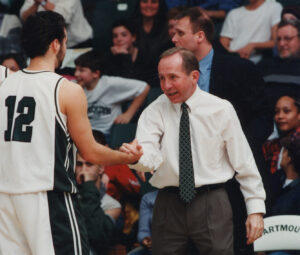
Dave admits it’s hard for him as a father to follow his son’s games. “I’m more nervous watching his games than I was coaching my own games,” he said. “I do enjoy the evaluation process, watching (film) after and then talking to him the next day. I literally only say anything if I’m asked the question. I don’t give my opinions. We have a great relationship and we communicate regularly.”
Which Scott loves. “I call him almost everyday on my commute to work,” he said. “We talk about life, family and obviously a lot of basketball. I definitely use him as a sounding board. We mostly just bounce ideas off of each other and talk through a variety of things. Sometimes it’s in regards to team dynamics, Xs and Os, or recruiting. He watches every game so we usually talk about recent games and upcoming opponents. He will raise questions that challenge (in a good way) what I am coaching to my team. It helps me think deeper into the ‘why’ behind all things that I coach/emphasize with my team.”
After a solid four-year career playing at Wheaton, Scott was ready to become a college coach. He already had some experience running the Longhorn AAU Basketball Club in the Upper Valley, which is still in existence.
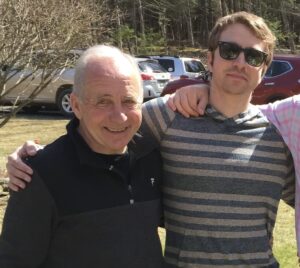
When Scott applied for coaching jobs, one thing he did was reach out to people he knew. One person that he contacted was Josh Meyer, the new head coach at St. Michael’s College in Winooski, Vermont, an NE-10 school. Scott knew Meyer from when his family spent a year in Hanover. “He was a gym rat himself when he was in high school,” Scott recalled. “When he moved to Hanover that one year, he spent every day around the Dartmouth gym. I got to know him that one year. My brothers got to know him very well. He’s a little older than I am.”
As it turned out, Meyer had an opening on his staff. “That gave me my first opportunity,” Scott said. “I was the second assistant up there. I didn’t make any money learning a lot every single day and working my tail off and trying to continue to learn and grow as a coach.”
He did that for one year and then took an assistant’s job with D-III Bowdoin. “They’re in the same conference (NESCAC) that my brothers played in at Middlebury,” he said. Scott worked under veteran coach Tim Gilbride. “He’d been around a long time; a very smart basketball mind. I learned a lot from him.”
As he noted, small colleges have small staffs, so he was the only assistant. “It was him and I working together every single day,” Scott said. “You really get thrown into the fire of having to do everything.”
That meant multiple duties, like doing the scouting report, all the recruiting, all the travel booking; just anything you can think of that involves the college program. “I had to do it at the small-college level as an assistant,” he recalled. “You learn every single day. You take it all in. It was an awesome experience that prepared me to become a head coach.”
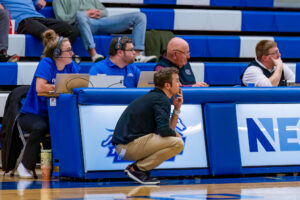
Which he became in 2018 when he applied for and got the head job at Nichols, a D-III regional power. He stepped into a winning situation and was able to sustain what the previous staff had built there. “I was lucky at a young age to get that head coaching job,” he said. “I inherited a really, really talented Division III team that at that time were used to success.”
With Scott at the helm, the Bison were able to remain a top-flight team in New England. They went 28-3 and advanced to the NCAA Elite 8 for the first time in school history.
Then, bang, the Assumption job opened up. Scott really liked the NE-10. Being at St. Michael’s, he had gotten used to the league. Growing up in New Hampshire, he was very familiar with the local NE-10 teams at Southern New Hampshire University, Saint Anselm College and Franklin Pierce.
“I loved the balance of the scholarship level of basketball, but it’s still a small college, which is what I was used to coming from a Division III basketball,” he said. Scott also liked that Assumption had a rich basketball tradition going back to the 1950s.
Unfortunately when he got there, the Greyhounds had been in a tailspin with six losing seasons without double figure wins. “It was a little bit more of a rebuilding situation,” he said. Scott was up to the task. That first year (2019-20) Assumption went 14-12, a huge improvement.
But then Covid-19 hit and the end of the season was canceled (no national tournament). The following season was canceled. Period. That was tough for everybody. “We were really excited about what we were building and then Covid came along,” Scott said. “We didn’t know what’s going on.”
Spring workouts were canceled in 2020, and then the 2020-21 season was canceled. “It made recruiting difficult after that following year because you can’t get people on campus to visit,” Scott said.
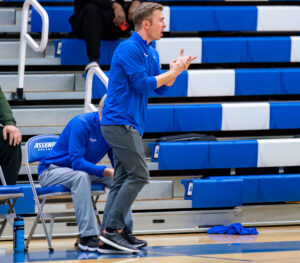
Scott found he had to approach things differently with players being granted a fifth year of eligibility. It affected the transfer portal. Coming into the 2021-22 season, he essentially had two new classes that hadn’t played with each other at all. “It was challenging to try and build chemistry at that time, and the lack of reps we had together.” Scott felt good about how his team competed and was happy with the season, which ended with a record of 12-13. The Greyhounds followed that up with a 14-14 mark last season.
Dave shakes his head because the basketball landscape is a far cry from what he was used to at Dartmouth. Sometimes he wishes Scott had chosen another profession like his brothers – one works in finance and the other in pharmaceutical sales. “It’s not an easy way to make a living,” he said. “He’s got twins now. It’s a stressful life. I didn’t sleep the night before (a game). I didn’t sleep the night after. He has his life in more perspective than I had.”
Dave pauses and then continues. “Then I talk to his brothers. Yeah, they’ve got their families. They’ve got their jobs. They go home from work. That’s it,” he said. “It’s not like that being a coach. You’re always working in a sense. It can be very stressful. There’s a part of me that wishes he was into something else. But if you have a passion for something, you have to follow it.”
When Scott was still in college and had helped to develop the Longhorn AAU Club, Dave remembers seeing him coach his first game at a facility in Plaistow, N.H. “The way he was with the kids, I said, ‘Oh boy, he’s pretty good for a young kid.’ Who knows, but it’s still a tough way to make a living.”
When Dave looks at college basketball today, he sees something out of control with the transfer portal and NIL (Name, Image and Likeness). “I have no desire to get involved with that type of thing. But I’m 75,” he said.
Recruiting is such a vital part of college athletics and the transfer portal has made it easier to transfer. Dave mentions that Scott’s best player last year, Isaiah Gaiter, transferred to D-I South Alabama for his senior year. He is leading that team in scoring. “You evaluate the kids and you think you see something special and what you see is right,” Dave said. “But now they’re gone. There’s so many things you can’t control. You have to recruit your own players every year and then be aware of the transfer portal.
In the wake of losing Gaiter, Dave mentioned that Scott recruited a pair of D-III players rather than go after D-I guys. “One is the leading scorer and the other played 40 minutes the other night and is probably his best defender,” Dave said. “That’s taking a chance. That’s believing in yourself. That’s also taking kids that are hungry to prove that they can play at the next level not (D-I) kids that think they are all that coming in.
“It’s a different approach,” Dave added. “I’m really proud of him for taking that. At the end of the day you’ve got to take an approach that wins. Now next year is going to be a whole new dynamic. Is that what you really want to do? Every year is so different. Every year can change so drastically in the college basketball landscape.”
Scott has not forgotten his New Hampshire roots. He has made sure his roster has a few Granite State players. The current roster includes sophomore Jacob Gibbons (Exeter) and freshman Michael Pitman (Pembroke). Scott has also coached graduated Granite State players Evan Gray (Somersworth) and Cal Connelly (Rochester). Connelly is an assistant hoop coach at Roger Williams University.
Dave still keeps his hand in basketball. He’s an analyst for Dartmouth games on ESPN+. And he stays close to the Dartmouth program, going to functions, games and practices. “And I follow Scott’s games,” he said. “Between basically having a normal life.”
To prepare for a cable game, Dave will go to a Dartmouth practice, watch film and see the scouting report on the opponent, get the game plan and watch the actual practice. Then he’ll talk with the opposing coach. “We’ll see what they’re trying to do,” he said. “It keeps me in the game. It keeps my interest level up. I know all the Dartmouth players. It’s enjoyable.”
Then with Scott’s games he is watching those twice a week. “I look forward to the nights that there are no games,” he says with a laugh. “There’s no stress. It’s good.”
While Dave sometimes frets about his son’s vocation, Scott is all in. He loves what he does and he loves the conference he is doing it in. “It’s a really, really fun basketball conference,” he said. “Everybody’s good. There’s actually no nights off. No one’s better than anyone else to be honest. The teams that end up being at the top are a little more consistent night in and night out.”
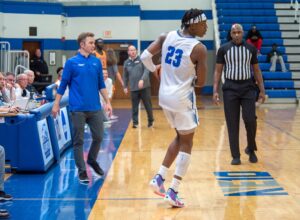
Just look at the standings. The Greyhounds are tied for sixth with Pace, one game out of fourth behind Southern Connecticut and Southern New Hampshire, and just a game ahead of Saint Anselm, lurking in eighth. “It changes fast right now,” Scott said. “If you look at the standings, the bulk of the teams kind of beat up on each other. That’s the way our league has always been.”
Of course, along with the coaching Scott has to juggle family life with Lindsay, who he met at Wheaton. They own a house in her home town of Cranston, Rhode Island, where she is an art teacher. “One thing, it’s a hard balance,” he said. “My dad did a good job with that. Obviously he had three kids and he was a coach himself. I was able to see what that can look like by being able to balance your time appropriately.”
With twins, there’s not a lot of sleep going on for either parent. “Especially in the middle of the winter with our season,” Scott said. “There’s a lot of different challenges. I do the best I can with that.”
It comes down to priorities. “Be a great father, be a great basketball coach and be a great husband,” he said. “You have to limit some of the other things.”


